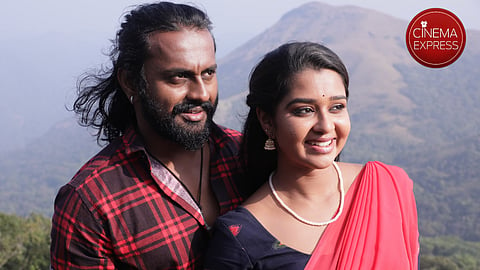Kuladalli Keelyavudo Movie Review: Promises fire, delivers ash
Kuladalli Keelyavudo (2 / 5)
Some films arrive flaunting big names and even bigger messages. But when the narrative lacks grip and the emotions fall flat, what remains is a muddled mess. Kuladalli Keelyavudo, written by Yogaraj Bhat and Isla Uddin, and directed by Ramnarayan, is a prime example of this cinematic misfire—ambitious, noisy, but ultimately incoherent.
The film sets out to address caste disparity—a subject deeply rooted in reality and worthy of nuanced storytelling. Yet, despite societal progress on the ground, this attempt feels dated and poorly translated to the screen. The narrative begins on land rights and identity only to devolve into confusion wrapped in half-baked symbolism.
Director: Ramnarayan
Cast: Madenur Manu, Mouna Guddemane, Sharath Lohithaswa, Tabla Nani, and Karisubbu
The story follows Mutharasa (Madenur Manu), a member of a marginalised community known for playing drums at funerals. Their forest-dwelling tribe is displaced, moved into the city, and then struggles to reclaim its ancestral land. On paper, it’s a layered tale about belonging and resistance. On screen, it’s a choppy sequence of events that never emotionally or intellectually clicks.
There's also Entegowda, a mysteriously ill child meant to represent society's fractured moral compass. His disappearance and sudden reappearance could have added weight, but it plays out like a narrative gimmick rather than a transformative moment. Meanwhile, a glaring continuity lapse—where child actors playing Madenur Manu and Sharath Lohitashwa appear the same age initially, only for one to inexplicably age years ahead—feels like an unforced error.
Yogaraj Bhat's writing strains under the weight of its own pretension. It's as if he’s desperate to inject depth through layers of metaphor—crematoriums, flowers, forests, and endless flashbacks—but none of it resonates. The dialogues are long-winded and overwrought, contributing more to audience fatigue than insight.
Ramnarayan, in his directorial approach, reaches for poetic flair—sepia tones, dramatic frames, and haunting close-ups. But without a solid emotional base, these stylistic choices feel like hollow gestures. Visual polish cannot redeem structural weaknesses. Even the soundtrack, helmed by the usually reliable Mano Murthy, wavers.
Performances mirror the writing—misaligned and underwhelming. Madenur Manu may look the part as Mutharasa, but his vacant expressions betray no pain, no inner turmoil. The audience is left untouched. Mouna Guddemane as Lacchi offers a brief glimmer, but her role is too limited to leave a lasting mark. Sharath Lohithaswa brings energy to his villainous Rayappa, yet the character is sketched so thinly he comes off more as a caricature than a threat.
Worse still, the film overloads itself with a barrage of secondary characters—Nayana, Tabla Nani, Kari Subbu, Dragon Manju, Seenu Bhai—none of whom are explored or developed. They drift in and out like props in a drama that's unsure of its focus. A particularly intriguing subplot about selling hair oil from the forest community is introduced, then abruptly abandoned—another missed opportunity that could’ve been an inspirational story on its own.
The camera often lingers on a towering Hanuman statue, meant to suggest strength or faith, but like much in the film, it leads nowhere.
Kuladalli Keelyavudo attempts to tackle caste, displacement, and betrayal. But its execution is clumsy, slow, and emotionally disconnected. The message is there but buried beneath narrative chaos and cinematic overreach.
This leads to a bigger question: Why do some filmmakers still cling to recycled, undercooked ideas instead of exploring today's urgent, lived realities? This film claims to “talk about the people,” but never truly speaks for them.
Ramnarayan appears to have operated within the confines of a rigid script, never daring to improvise or elevate. As a result, Kuladalli Keelyavudo ends not with impact, but with a whimper. It wanted to roar—but barely mumbled. Skip the film, stream the classic title track, and save time.

